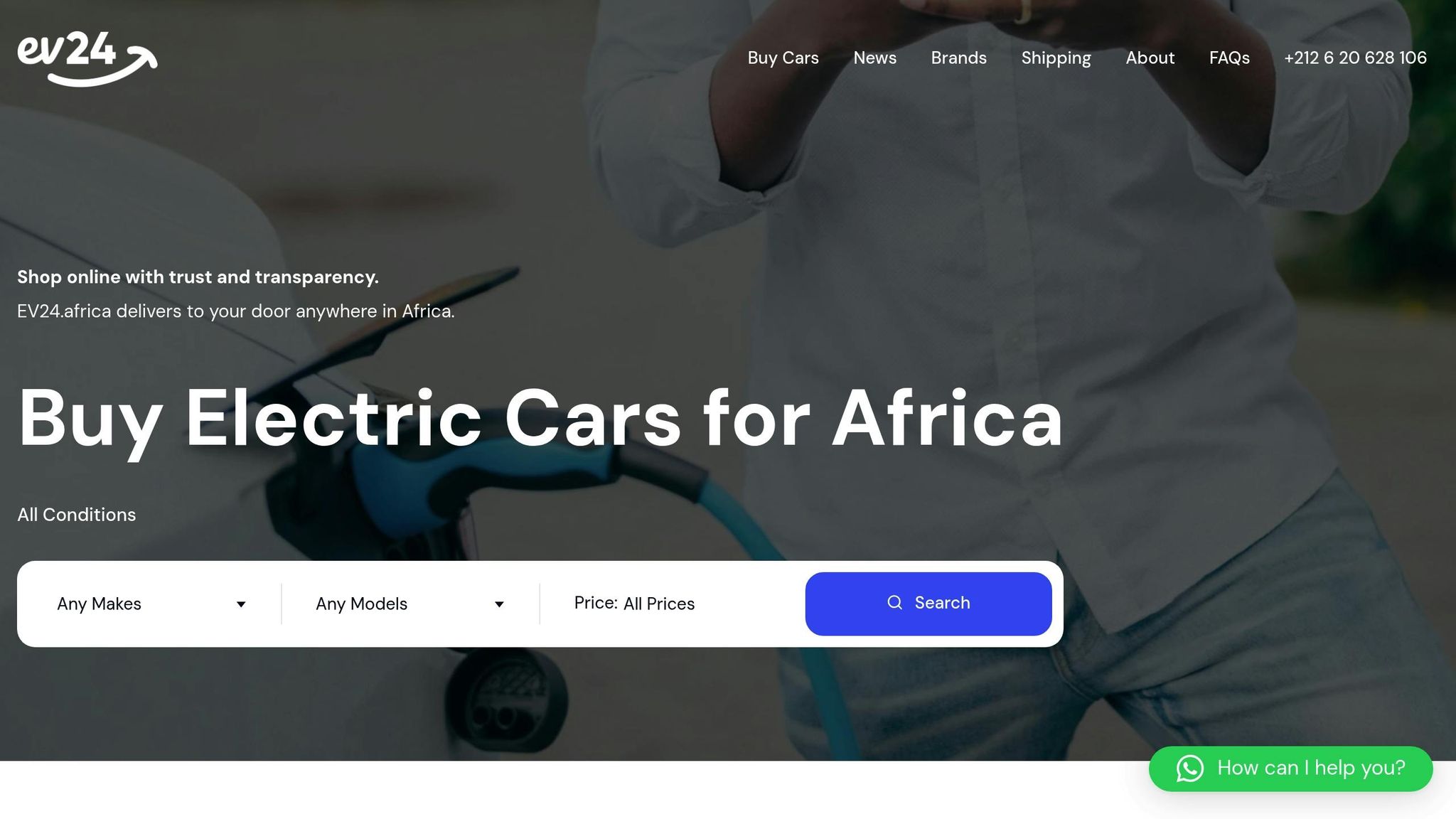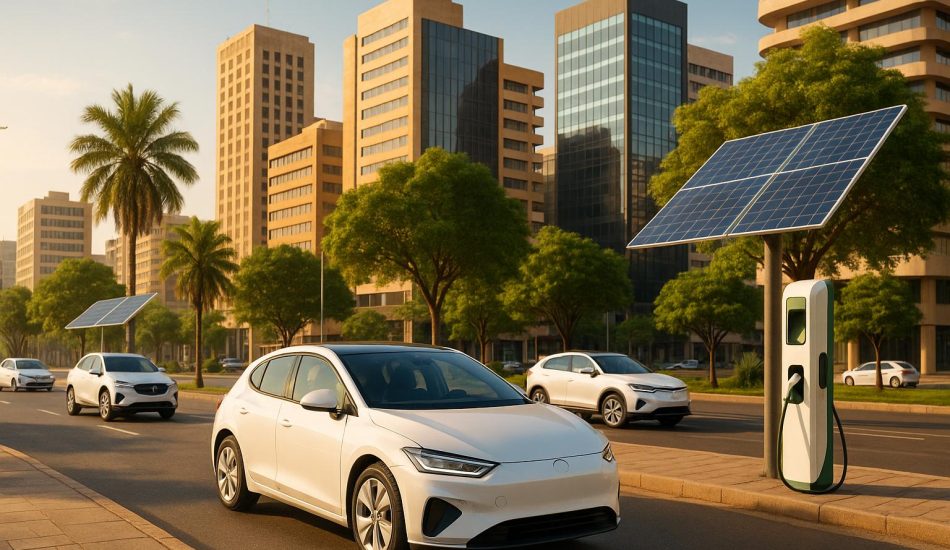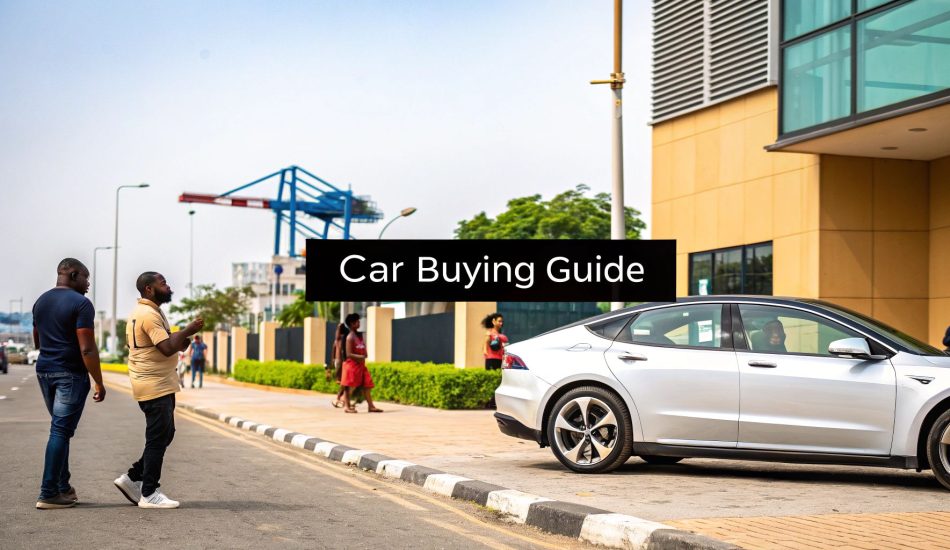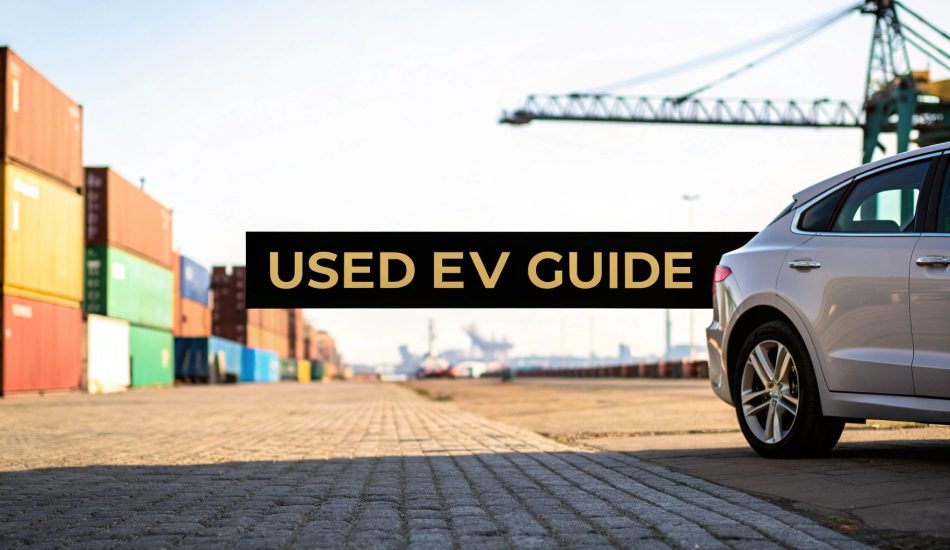
Eswatini’s 2025 plan on bringing in electric cars (EVs) is changing things. Here’s what you need to know:
- No Tax or Fees: All electric cars don’t have VAT or customs fees, making them cheaper.
- Need Permits: If you’re a private buyer, a business, or an NGO, you must get a permit before buying.
- Main Costs: Fees to customs brokers (2-5% of the car’s price), tests for fit-to-drive (~$11), and mail fees (~$25).
- Lots of Forms: You must have all import forms, seller bills, and permits. If you miss any, it may hold up or stop your process.
- Power Goals: Matches with Eswatini’s aim to cut back on electricity they buy to just 20% by 2025.
Hint: EV24.africa can make it easier by managing permits, customs, and shipping.
For a good importing time, get ready early, check all papers are right, and think about help from pros to dodge fines or hold-ups.
Key Updates to EV Import Rules by 2025
To keep up with the rise in electric vehicle (EV) use and green energy goals in Eswatini, the 2025 import rules bring big changes. These updates clarify who can bring in EVs, list all needed papers, and back the country’s wider energy plans.
Who Can Bring in EVs
The new set of rules sort EV importers in Eswatini into three groups, all needing import permits. These permits are a must for EVs since they are seen as motor vehicles and gadgets needing special okay.
- Private importers: People bringing in EVs for their own use need permits from the Ministry of Finance before placing orders.
- Commercial importers: This group covers car shops, firms with EV fleets, and those reselling EVs. They need to give more paper work as listed in the rules.
- Non-government importers: NGOs, world groups, and others bringing in EVs for their work fall in this group, highlighting clean energy’s part in growth.
All importers must sign up with customs and finish their forms before ordering cars. For imports from outside the Southern African Customs Union (SACU) area, the Ministry of Finance must okay the permits. Not full forms may lead to hold-ups, so detail is key.
Needed Import Papers
Under the new rules, importers must fill a written form for the Principal Secretary at the Ministry of Finance. Forms are at Mr. Malangeni Mhlabane’s office, Office 102 (tel: 2404-8145).
Needed papers include:
- A full bill of entry, given to customs.
- Copy of supplier invoices, noting the car’s start to set the right tariff class and worth.
- An Eswatini import permit.
For items from outside the SACU zone, customs officers will set a final value and give a Customs Clearance certificate at the first point of entry. Given how complex these needs are, working with known clearing folks is wise to dodge problems.
How Rules Fit With Local Plans
The 2025 EV import rules mesh with Eswatini’s aim to cut its need for bought electricity from 80% to 20% by 2025. By pushing for more EV use, the land wants to up the need for its own clean energy.
Eswatini has okayed 86 small green energy works, adding 2.2 megawatts to the main grid. Also, two big solar works, set to add 20 megawatts, should start by August 2025. Making it easier to bring in EVs backs these green energy plans.
Trade rules also have a big role. Eswatini is using $114 million in not used trade chances with the EU through the EU–SADC Economic Deal. With goods sold to the EU at $106.4 million in 2024, this stable trade scene backs the EV import setup.
"The current trade climate is a concern, but it also creates an opening for Eswatini to reposition itself as a stable and competitive export hub", says Mawenzi Dlamini, ITC’s Project Operations Manager in Eswatini.
This smart spot may pull in EV makers and supply groups, setting up Eswatini as a door to the big Southern African market. The rules are set to make more jobs in customs work, car fix, and power set-up build.
"The market is there. We’re helping businesses seize these opportunities, move up the value chain, and tackle unemployment head-on", explains Sibusiso Mnisi, Manager of External Trade at the Eswatini Investment Promotion Authority.
With these new rules set, the next part will look at the fees and costs for those who bring in goods.
Costs When You Buy a Car from Another Country
Knowing all about the costs when you bring a car from another country can help you plan and avoid any surprise costs. With new rules starting in 2025, how they figure out some costs will change, and there are also perks to push people to get electric cars (EVs). We will go over the main costs, perks, and how you can pay with these new rules.
Costs when Importing
The Eswatini Revenue Authority (SRA) handles the import costs following the Customs and Excise Act from 1971. Eswatini is part of a group called the Southern African Customs Union (SACU), and they all charge the same outside tariff. They figure out these fees by looking at the car’s price plus shipping costs using the CIF method. On top of this, SACU, including Eswatini, adds a tax on goods from other places in the union and from outside countries.
Here are some costs to look at:
- Letter of Authority application: It can be from 300 to 1,800 ZAR ($16–$98 USD).
- International courier fee: About 450 ZAR ($25 USD).
- Roadworthiness test: Close to 200 ZAR ($11 USD).
- Customs broker charges: Usually between 2% and 5% of the car’s CIF value. For a $28,000 EV, this could be from $560 to $1,400.
Perks for Bringing in EVs
Eswatini has several perks to help make it easier for people to buy electric cars. All-electric cars don’t have to pay VAT or customs fees, which makes them cheaper. Cars that are part electric get some cuts in import fees, but not as much as all-electric cars. Eswatini being part of trade groups like SADC and COMESA means they get special rates for cars from those places. Make sure you know where your car is from to get these perks.
How to Pay and Deal with Money
The SRA lets you pay in Eswatini Lilangeni (SZL) or South African Rand (ZAR), which match each other in value. For people in the U.S., the exchange rate is often between 18 and 20 SZL per USD, but this can change every day. You need to pay all fees before you can get your car. You can use bank transfers, checked checks, or digital payments through the SRA’s systems. They usually don’t take cash for big payments.
Choosing when to change your money is key, as they figure out import fees when you clear customs. Changes in the exchange rate from when you order to when you get the car can change your costs. To avoid this, many people lock in rates ahead of time with something called forward contracts or by hedging the currency.
"ERS remains steadfast in advancing innovative trade facilitation solutions that attract investment and drive sustainable development." – Brightwell Nkambule, ERS Commissioner General
The Eswatini Revenue Service is making its systems new and better. They are adding tech that makes it easy to pay customs. These changes were shown at the International Customs Day event in January 2025. To know the right costs, buyers should talk to the SRA to get the latest prices and rules. Also, services like EV24.africa help by taking care of customs and tax for buyers.
Getting Your EV into Eswatini
To bring your electric vehicle (EV) into Eswatini, you must follow set steps and stick to strict rules set by the government. The Ministry of Finance and Eswatini Revenue Authority check this to make sure all imports are up to the mark. Missing a step can lead to fines, hold-ups, or even taking away your car.
How to Import Step by Step
The work to import an EV starts before you buy it. Your first move is to get an import permit from the Ministry of Finance, which shows you can bring in the car.
How to Get Your Import Permit
To ask for an import permit, write to the Principal Secretary at the Ministry of Finance. Hand in seven copies of your form by Monday, no later than 4:00 p.m.. You must wait for a yes before you order your EV, as buying the car does not mean you will get the permit.
For private buyers, you must send in:
- A copy of your passport
- A tax clear paper
- A pro forma bill from the car dealer
Keep in mind, as a private person, you can only bring in one car every 12 months.
What to Do at Customs
When your EV gets here, you must show many papers at the first SACU entry point. These are:
- Your entry bill
- Seller bills
- Your okayed import permit
Also, you need to give in a customs saying paper and transport papers to end the clearance.
What to Do after Customs
After getting through customs, you have three days to give your used import permit back to the Ministry of Finance. With it, hand in a stamped copy of the Customs Bill of Entry, signed by the Bank and Customs, to show you brought the car in. This does it for your needed steps.
What If You Break Import Rules
Not following the import laws can lead to big troubles, like fines, losing your car, or being held.
Fines and Taking Your Car
Using with no good import permit can see you facing costs under Section 5 of The Import Control Order and Section 81 of The Customs and Excise Act. Breaking these rules can mean fines, losing your car, and costs for being held.
"Any restricted goods arriving without a valid permit is a breach of the requirements of Section 3 of The Import Control Order read together with the Section 37 of The Customs act." – Ministry of Finance, Eswatini
Car Hold-Up
If your electric car gets to Eswatini without the right papers, customs might hold it. Fixing this can take many weeks or more, making you wait longer and pay extra.
False Info Fines
Giving wrong or not full facts to the Finance Office may cause more fines. Always check your form well, make sure all numbers, car facts, and bills are right before you hand it in.
Age Limit Rule Break
Cars older than 15 years can’t get import papers. Trying to bring in an old electric car will lead to a no on your form, and you lose any fee you paid.
More Steps for Businesses and Non-Citizens
Businesses and people from other places have more to do to bring electric cars into Eswatini.
Business Import Needs
Firms need a special business import paper with more files than a personal one. Files needed are:
- Incorporation certificate
- Group rules
- Trade permit
- Tax okay paper
- First seller bills
The Finance Office might check your place to make sure your business is real and can handle the cars.
After you use the business paper, give it back to the Finance Office within three days with a stamped Customs Entry, stamped by the Bank and Customs. If you don’t use it all, give back copies of the paper, Entry forms, CCA 1 Forms, and receipts for items you got.
Extra Steps for Non-Citizens
People from other lands must show they live or work in Eswatini legally when they ask for import papers. This proves you can stay and own things there.
They must follow the rule of one car each year, like citizens. Also, your living or work papers must be good all through the import time, up to when you register the car.
| What is needed | For Businesses | For Non-Citizens |
|---|---|---|
| More Papers | Business Rights, Sales Permit | Home/Job Papers |
| Check of Place | Could be needed | Not set |
Start early and make sure all your papers are right to save time and cash. Think about using help from pros like customs brokers or services such as EV24.africa. They can guide you well through the steps and help you dodge common traps that may cost you fines.
sbb-itb-99e19e3
How EV24.africa Makes EV Imports Easy

Bringing an electric car into Eswatini can be a tough job, with many forms to fill out, papers to handle, and rules to follow. But EV24.africa is here to make it all easy by taking care of every step from finding your car to bringing it to you. With a team of more than 200 workers in five African lands and links in over 40 countries, they make sure your car comes in without any trouble.
EV24.africa Services
EV24.africa gives you full help with bringing in electric cars. They link you up with a lot of EVs from places like Europe, Asia, North America, and Japan. Big names like Tesla, BYD, Volkswagen, Hyundai, Toyota, and Suzuki are there. You get all the car details and clear prices. This helps you think well before you buy.
The group takes care of each part of the import job based on big trade rules (Incoterms). You can pick door-to-door delivery for the most ease or port-to-port service, where you can get your car at the Port of Durban. For moving the cars, you have RoRo (Roll-on/Roll-off) and Container shipping, with expert tips to pick the best way.
Their network goes to all 54 African countries, hitting more than 20 ports on the land [13]. You also get real-time tracking, with news on your car’s trip as it moves. And, EV24.africa checks that every car fits Eswatini’s import rules.
Meeting Import Rules with EV24.africa
Sticking to the law is key when you bring in a car, and EV24.africa makes sure each vehicle fits Eswatini’s laws. They deal with customs, tags, and taxes, showing you what needs to be done. By working with global movers, customs folk, and port people, they stop hold-ups at customs and cut the risk of fines from missing papers.
Using trade terms like CIF (Cost, Insurance & Freight) and DAP (Delivered at Place), EV24.africa sticks to normal import steps. For a smooth time, they also have a Delivered Duty Paid (DDP) service, where they handle all taxes and duties for you. Also, with Eswatini’s tax cuts on 100% electric cars – including VAT and customs duties – EV24.africa helps you find cars that get these breaks.
Tips for Using EV24.africa
To use EV24.africa well, begin by looking at their site. Check out the electric cars, match car features and costs, and work out your full import costs. This move will help you know what’s coming before you buy.
Talk to their team for a custom price for your needs. Their pros can walk you through it and suggest the best shipping way – whether it’s RoRo or Container shipping – for you.
"At EV24.africa, we simplify the process of importing and buying electric vehicles in Africa. Our expertise ensures a seamless, transparent, and stress-free experience, so you can focus on driving the future of mobility."
For the best ease, think about choosing their door-to-door delivery service that takes care of all from buy to final drop-off. But, if you like to deal with some of the work, the port-to-port option lets you get your car at the Port of Durban. Use their live tracking tool to keep an eye on your car’s travel. This makes sure you’re set for each part of the import job and helps you dodge delays and fines, which can often mix up Eswatini’s import rules.
Main Points for 2025 EV Import Rules
In Eswatini, all electric cars now get to skip paying VAT and customs, making it easy for buyers to get them. Also, the Ministry of the Economy has cut down import fees for many car types, to push people to get them. For details on fees and duty costs, it’s smart to talk to the Eswatini Revenue Authority (SRA) Customs and Excise Department.
What’s New in Rules and Costs
The 2025 rules set clear steps to bring in electric cars and give big money perks. Import permits are a must for everyone bringing in cars, be it for personal use, businesses, or groups. Each one must send a written form to the Ministry of Finance, with stuff like entry bills, seller bills, and valid import permits.
How EV24.africa Helps Importers
To guide importers, EV24.africa gives full help. They handle customs, car papers, and tax stuff. With easy-to-follow rules like Delivered Duty Paid (DDP), EV24.africa makes sure duties and papers are all set right. Using the Port of Durban in South Africa for sending to Eswatini, they use local know-how to make things easy, making sure customers have a smooth time. This way cuts down on the hassle of rules and helps the earth too.
Good Things from Using Electric Cars
Going for electric cars means using local green energy, making EVs fit better in daily life. With good money perks and help from EV24.africa, those who start early can travel cheaper and cleaner. These steps also help importers do well in Eswatini’s big EV market.
FAQs
How do Eswatini’s 2025 EV import laws help the country meet its energy and green goals?
In 2025, Eswatini’s rules for bringing in electric vehicles (EVs) are key to changing how the country uses energy. By pushing for more EV use, these rules aim to cut back on the need for outside electricity and better use energy made at home. The big plan? To lower the buy of outside electricity from 80% to 20% and to reach 70% use of green energy by 2025.
Also, these rules work to cut down on carbon output and push for lasting growth. They fit with Eswatini’s larger goal to keep energy safe and take on climate change right away. These rules are a big step towards a clean and lasting energy future for the country.




